Contents
What is an online coaching platform?
An online coaching platform is a digital tool or service that facilitates the delivery of coaching services over the Internet. It provides a centralized platform where coaches and clients can interact, communicate, and access resources remotely. These platforms leverage technology to overcome geographical barriers and enable coaching sessions to take place virtually, regardless of the participants’ locations.
online coaching platforms offer a convenient and flexible solution for coaches to deliver their services remotely, expand their reach to a global audience, and provide personalized support to clients in various areas such as life coaching, career coaching, health coaching, and more. These platforms leverage technology to streamline the coaching process, enhance communication and collaboration, and ultimately empower clients to achieve their goals and aspirations.
Your Roadmap to Building the Perfect Coaching Platform
In the digital age, having a strong online presence is crucial for coaches to reach a wider audience and provide their services efficiently. A coaching website and mobile app can serve as powerful tools to connect with clients, offer resources, and manage schedules. However, with numerous platforms available, selecting the right one can be overwhelming. To help you make an informed decision, we’ve compiled a guide on how to choose the best platform for creating a coaching website and mobile app.
10 Steps to Choosing the Right Website & Mobile App Builder
Define Your Goals and Requirements:
Before exploring platform options, clearly define your goals and requirements. Consider factors such as the type of coaching services you offer, target audience demographics, desired features, budget, and technical expertise. Understanding your needs will guide you in selecting a platform that aligns with your objectives.
Assess Platform Features:
Evaluate the features offered by different platforms to ensure they meet your requirements. Key features to look for include customizable templates, scheduling tools, payment processing integration, client management systems, content management capabilities, mobile responsiveness, SEO optimization, and analytics tracking. Make a checklist of essential features and prioritize them based on importance to your coaching business.
Consider Ease of Use:
Opt for a platform that is user-friendly and intuitive, especially if you lack technical expertise. Look for drag-and-drop website builders or app development frameworks that simplify the creation process. A streamlined interface will enable you to design and manage your coaching platform efficiently without extensive coding knowledge.
Review Customization Options:
Personalization is essential for creating a unique brand identity and delivering a tailored experience to your clients. Choose a platform that offers extensive customization options for branding, design elements, color schemes, typography, and layout. Additionally, ensure flexibility in adding or modifying features to adapt to evolving business needs.
Evaluate Integration Capabilities:
Integration with third-party tools and services enhances the functionality of your coaching platform and improves workflow efficiency. Check if the platform supports integration with popular tools such as scheduling software, CRM systems, email marketing platforms, social media channels, and payment gateways. Seamless integration will streamline operations and enhance the user experience.
Assess Scalability and Growth Potential:
Consider the scalability of the platform to accommodate future growth and expansion of your coaching business. Choose a platform that can scale with your needs, whether it’s handling increased website traffic, adding new features, or supporting a growing client base. Additionally, assess upgrade options and pricing plans to ensure scalability without incurring significant costs.
Review Security and Compliance:
Protecting sensitive client data and ensuring compliance with privacy regulations are paramount concerns for coaching businesses. Prioritize platforms that adhere to industry-standard security protocols, such as SSL encryption, data backup, secure payment processing, and GDPR compliance. Verify the platform’s reputation for reliability and security through reviews and testimonials from other users.
Consider Support and Resources:
Select a platform that offers comprehensive customer support and resources to assist you throughout the website and app development process. Look for platforms that provide documentation, tutorials, FAQs, and responsive customer support channels such as live chat, email, or phone support. Access to a supportive community or user forums can also be valuable for troubleshooting issues and sharing best practices.
Evaluate Pricing and Cost-Effectiveness:
Compare pricing plans and subscription models of different platforms to determine the most cost-effective solution for your budget. Consider factors such as upfront costs, ongoing fees, transaction fees, and additional charges for premium features or upgrades. Choose a platform that offers transparent pricing and aligns with your budgetary constraints while providing the necessary features and support.
Seek Feedback and Recommendations:
Lastly, seek feedback and recommendations from fellow coaches, industry experts, or online communities who have experience with different platforms. Their insights and firsthand experiences can provide valuable insights into the pros and cons of various platforms, helping you make a more informed decision.
In conclusion, choosing the best platform for creating a coaching website and mobile app requires careful consideration of your goals, requirements, features, usability, customization options, integration capabilities, scalability, security, support, pricing, and feedback from other users. By following these guidelines and conducting thorough research, you can select a platform that empowers you to build a successful coaching business online and effectively engage with your clients.
Top 8 online coaching platforms
Thinkific
A powerful all-in-one platform that allows you to create, market, and sell your online courses, coaching programs, and memberships. It has a user-friendly interface and a wide range of features, making it a great option for both beginners and experienced course creators.
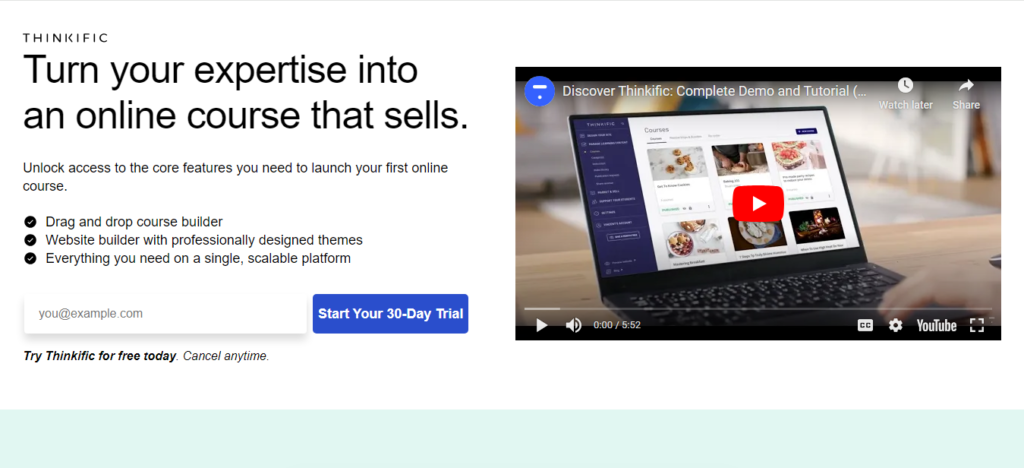
Features:
- Content Creation: Build interactive courses with multimedia, quizzes, assignments, and certificates.
- Delivery & Management: Schedule drip content, track student progress, and offer private communities.
- Monetization: Sell courses individually or with memberships, set flexible pricing, and accept various payments.
- Marketing & Sales: Create landing pages, email marketing campaigns, and sales funnels (upgrade to Pro plan).
- Analytics & Reporting: Monitor student engagement, sales data, and key performance metrics.
Pros:
- All-in-one platform for courses, memberships, and payments.
- User-friendly interface with drag-and-drop course builder.
- Affordable pricing plans, good value for money.
- Diverse pricing options for courses and memberships.
- Large library of educational resources and tutorials.
Cons:
- Limited marketing automation features compared to competitors.
- Smaller community compared to platforms like Kajabi.
- No built-in video hosting (integrations required).
Kajabi
Another all-in-one platform that is similar to Thinkific, but with a focus on marketing and sales automation. It includes tools for email marketing, landing page creation, sales funnels, and more. Kajabi is a good option for coaches who want to sell their services online and build a recurring revenue stream.
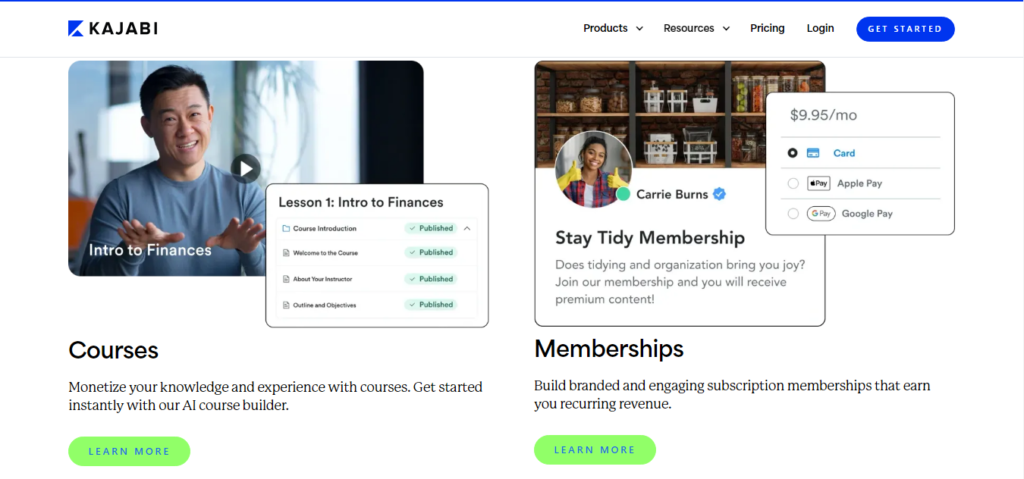
Features:
- Content Creation: Design courses, memberships, coaching programs, and landing pages.
- Delivery & Management: Drip content, manage student progress, host webinars, and create communities.
- Monetization: Sell products with powerful sales funnels, subscriptions, and one-time payments.
- Marketing & Sales: Build automated email campaigns, landing pages, and sales funnels with advanced features.
- Analytics & Reporting: Track key metrics, identify trends, and analyze student engagement.
Pros:
- Powerful marketing automation for personalized campaigns.
- Strong sales features for recurring revenue generation.
- Excellent community support and educational resources.
- High-quality video hosting built-in.
- Ideal for coaches who want to scale their business.
Cons:
- Steeper learning curve compared to simpler platforms.
- Expensive for beginners with more feature-rich plans.
- Limited integrations compared to some competitors.
Teachable
A popular platform that is specifically designed for creating and selling online courses. It has a simple interface and a wide range of pricing options, making it a good choice for both beginners and experienced course creators. Teachable also offers a marketplace where you can sell your courses to a wider audience.
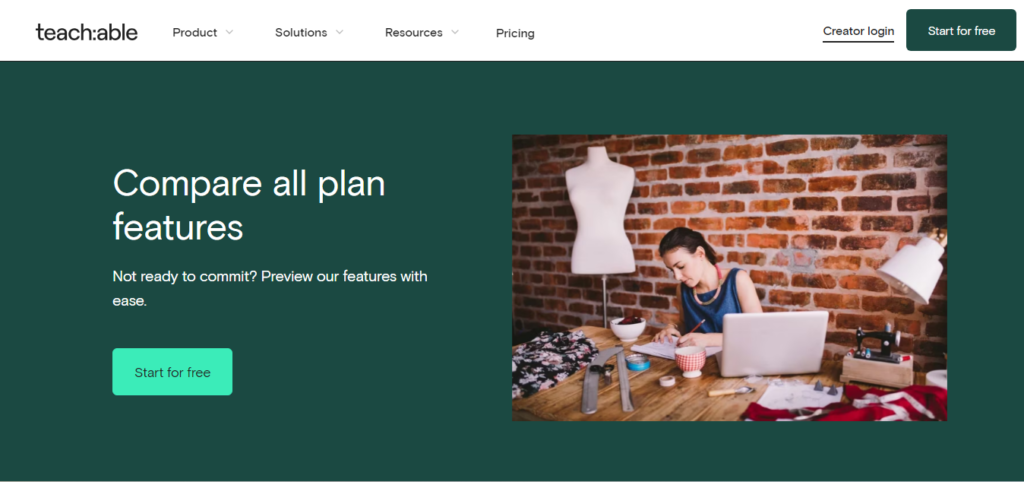
Features:
- Content Creation: Build courses with video, audio, text, quizzes, and downloadable resources.
- Delivery & Management: Drip content, track student progress, and set discussion forum features.
- Monetization: Sell individual courses, bundles, and subscriptions with various payment options.
- Marketing & Sales: Design basic landing pages, create coupons, and integrate with email marketing tools.
- Analytics & Reporting: Track key metrics like sales, completion rates, and student engagement.
Pros:
- Simple and user-friendly interface, easy to get started.
- Wide range of pricing plans to fit any budget.
- Large marketplace for wider reach and potential students.
- Excellent customer support with readily available resources.
Cons:
- Limited marketing features compared to Kajabi or Thinkific.
- Basic community tools, not ideal for fostering deep engagement.
- Can feel restrictive for complex programs with branching paths.
LearnWorlds
A comprehensive platform that allows you to create, deliver, and sell online courses, coaching programs, and memberships. It has a wide range of features, including built-in marketing tools, a community platform, and a mobile app. LearnWorlds is a good option for coaches who want to create a fully integrated online coaching experience.
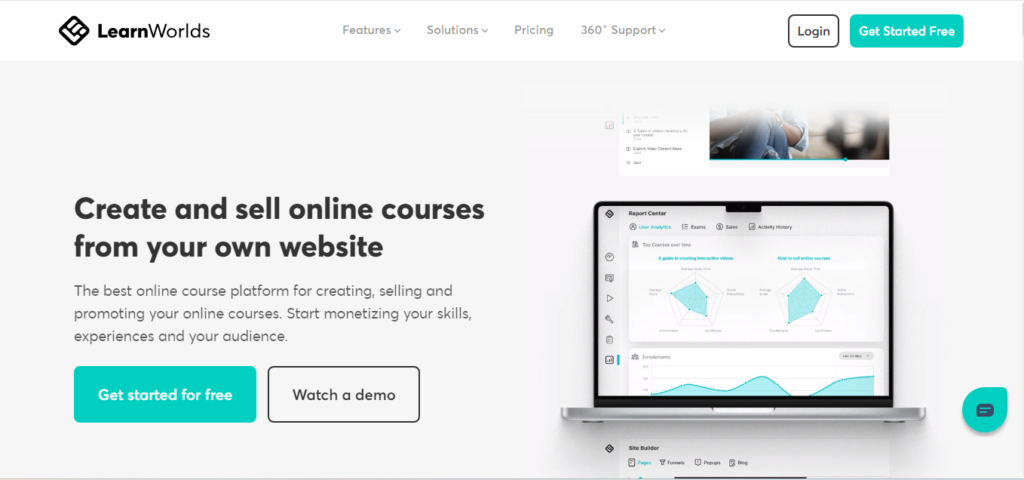
Features:
- Content Creation: Design engaging courses with multimedia, interactive elements, gamification, and assessments.
- Delivery & Management: Drip content, manage student progress, and offer white-labeled mobile apps.
- Monetization: Sell courses, memberships, coaching programs, and bundles with flexible pricing options.
- Marketing & Sales: Built-in marketing tools for email campaigns, landing pages, and coupon creation.
- Analytics & Reporting: Track detailed student progress, performance data, and identify engagement trends.
Pros:
- Comprehensive features for a fully integrated coaching experience.
- Mobile app for student convenience and engagement.
- Built-in marketing tools for streamlined workflows.
- Engaging learning experience with interactive elements.
Cons:
- Steeper learning curve with more advanced features.
- Not ideal for simple courses due to feature overabundance.
- Higher pricing plans compared to some competitors.
Podia
A platform that is specifically designed for selling digital products, such as online courses, ebooks, and webinars. It has a simple interface and a wide range of pricing options, making it a good choice for coaches who want to sell their products online without having to worry about creating a full-fledged membership site.
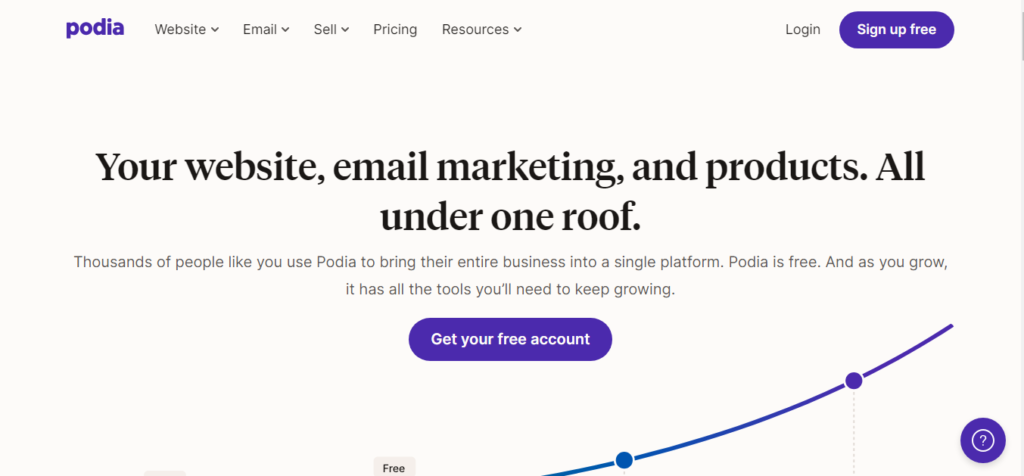
Features:
- Content Creation: Sell digital products like courses, ebooks, and webinars with simple landing pages.
- Delivery & Management: Manage downloads, schedule deliveries, and track product sales.
- Monetization: Set flexible pricing, offer coupons, and accept various payment methods.
- Marketing & Sales: Design basic landing pages, integrate with email marketing tools, and offer coupons.
- Analytics & Reporting: Track sales data, product downloads, and customer behavior.
Pros:
- Simple and streamlined platform, easy to use and navigate.
- Low fees compared to other platforms, good for individual products.
- Ideal for selling simple courses, ebooks, and webinars.
- User-friendly interface with minimal learning curve.
Udemy
A large marketplace for online courses on a wide range of topics. If you are a coach who wants to reach a large audience, Udemy is a good option. However, it is important to note that the competition on Udemy is high, so you will need to create high-quality courses that stand out from the crowd.
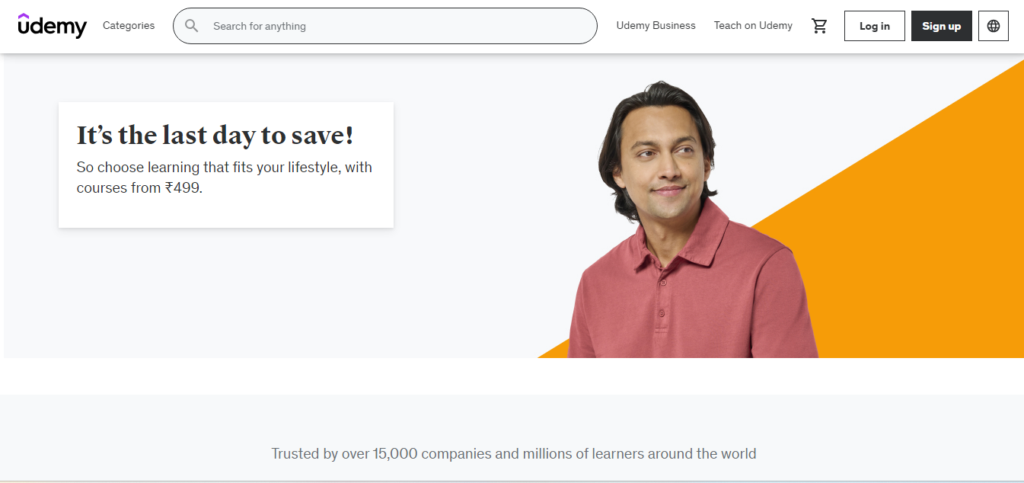
Features:
- Content Creation: Upload video lectures, create quizzes, and utilize discussion forums for student interaction.
- Delivery & Management: Track student progress, manage course content, and access basic analytics.
- Monetization: Set course price and earn revenue share based on Udemy pricing model.
- Marketing & Sales: Benefit from Udemy’s built-in marketing reach and audience promotion.
- Analytics & Reporting: View basic data on enrollments, completion rates, and student demographics.
Pros:
- Large audience reach through the Udemy marketplace.
- Built-in marketing efforts to Udemy users.
- Flexible pricing options, including free courses.
- Easy setup and minimal content management needs.
Cons:
- High competition with numerous instructors and courses.
- Low instructor revenue share compared to selling on your own platform.
- Limited control over branding, pricing, and student interactions.
Skillshare
A platform that offers creative and practical online courses in various fields. If you are a coach who specializes in creative skills, such as design, photography, or writing, Skillshare is a good option.
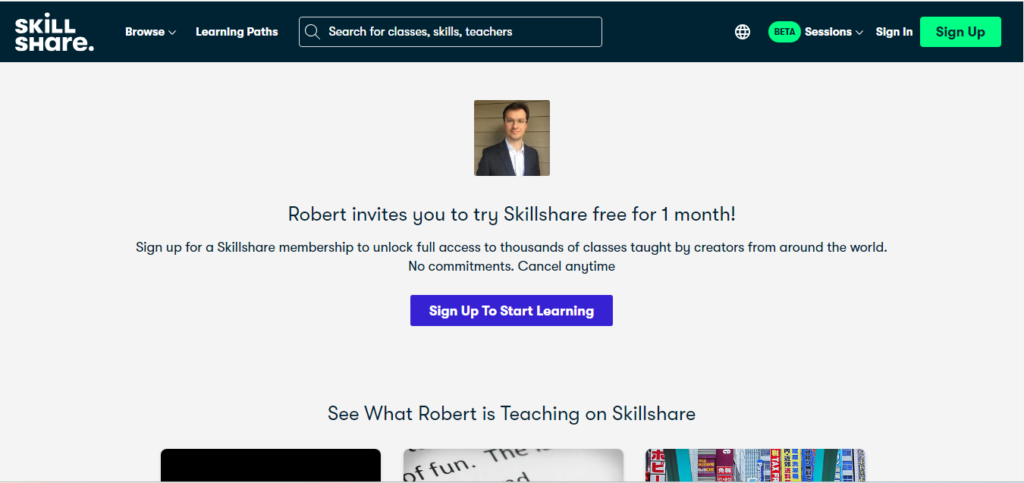
Features:
- Content Creation: Design creative and practical online courses with project-based learning activities.
- Delivery & Management: Engage with students through project submissions, discussions, and feedback.
- Monetization: Earn monthly revenue based on student watch time through a subscription model.
- Marketing & Sales: Benefit from Skillshare’s promotion within their platform and community.
- Analytics & Reporting: Track course performance, student engagement, and project submissions.
Pros:
- Targeted audience for creative skills like design, photography, and writing.
- Subscription-based model provides steady income potential.
- Strong community fosters engagement and interaction.
- Engaging project-based learning approach.
Cons:
- Limited customization options for branding and course structure.
- Lower course price point compared to other platforms.
- Focus on shorter, bite-sized content that might not suit all coaching needs.
Mighty Networks
A platform that allows you to create and manage online communities. If you want to build a community around your coaching practice, Mighty Networks is a good option. It offers a wide range of features, including discussion forums, live chat, and event management.
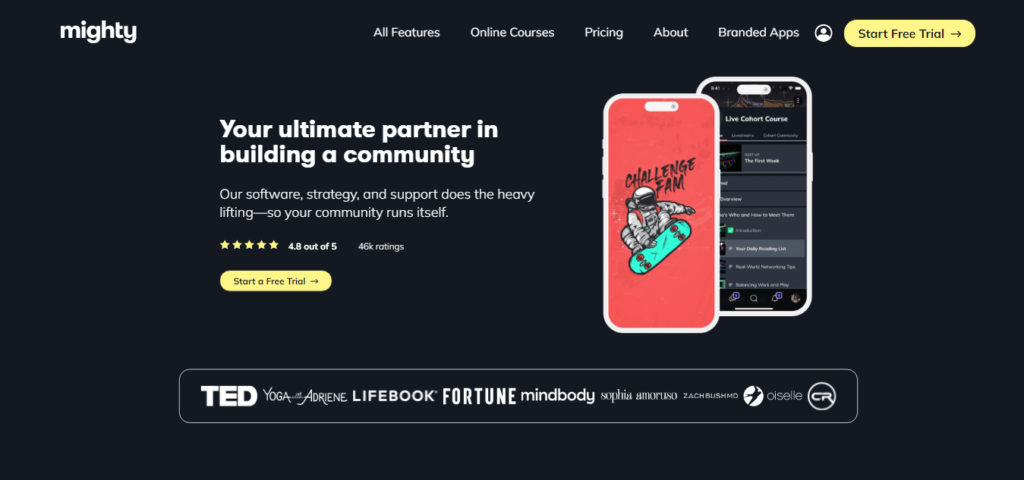
Features:
- Community Creation & Management: Build online communities with discussions, live chat, events, and membership options.
- Content Delivery: Share resources, host Q&As, and deliver coaching materials within the community platform.
- Monetization: Offer paid memberships with tiered access levels and exclusive content.
- Marketing & Sales: Utilize built-in tools for promoting your community and attracting new members.
- Analytics & Reporting: Track member engagement, activity levels, and key community metrics.
Pros:
- Strong community features for fostering engagement and interaction.
- Diverse pricing options for memberships and tiers.
- Ideal for building loyalty and a strong coaching brand.
- Flexible platform for various community-based coaching models.
Cons:
- Not built specifically for course delivery, limited content creation tools.
- Lack of sales and marketing features compared to dedicated coaching platforms.
- Might require additional integrations for course creation or sales funnels.

